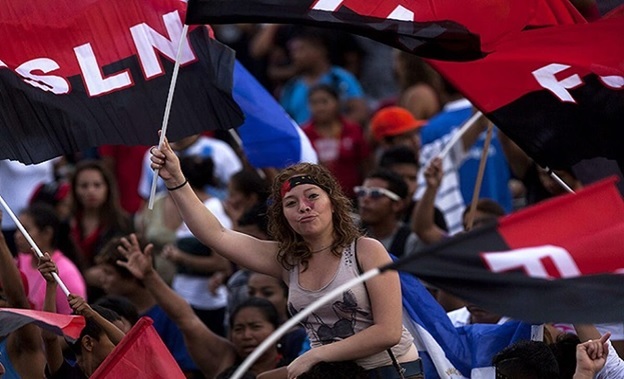The Gains of Nicaraguan Women During the Second Sandinista Government
Women, particularly those in the Third World, often find themselves with limited ability to participate in community organizations and political life because of the bondage poverty and their traditional sex role imposes on them. On them falls sole responsibility to care for their children and other family members, especially when sick; they maintain the home, cook the meals, wash the dishes, the clothes, bathe the children, clean the house, mend the clothes. This labor becomes unending manual labor when households have no electricity (consequently, no lights, no refrigerator, no labor-saving electrical devices), and no running water. The burden of this work impedes the social participation, self-expectations, and education of the female population.
Women in the Third World (and increasingly in the imperial First World) face problems of violence at home and in public, problems of food and water for the family, of proper shelter, and lack of health care for the family, and their own lack of access to education and thus work opportunities.
In Nicaragua, before the 1979 Sandinista revolution, men typically fulfilled few obligations for their children; men often abandoned the family, leaving the care to women. It was not uncommon to hear the abuse that men inflicted on women, to see women running to a neighbor for refuge. It was not uncommon to encounter orphaned children whose mothers died in childbirth, since maternal mortality was high. Common illnesses were aggravated because there were few hospitals and if there were, cash payment was demanded.
After the 1979 Sandinista victory, living conditions for women drastically improved, achievements the period of neoliberal rule (1990-2006) did not completely overturn. Throughout the second Sandinista period (2007- today), the material and social position of women again made giant steps forward.
The greatest advance has been made by poor women in the rural areas and barrios, historically without safety, electricity, water and sanitation services, health care, or paved roads. The liberation women have attained during the Sandinista era cannot be measured only by what we apply in North America: equal pay for equal work, the right to abortion, the right to affordable childcare, freedom from sexual discrimination. Women's liberation in Third World countries involves matters that may not appear on the surface as women's rights issues. These include the paving of roads, improving housing, legalized land tenure, school meal programs, new clinics and hospitals, electrification, plumbing, literacy campaigns, potable water, aid programs to campesinos, and crime reduction programs.
Because half of Nicaraguan families are headed by single mothers, this infrastructure development promotes the liberation and well-being of women. Government programs that directly or indirectly shorten the hours of household drudgery frees women to participate more in community life and increases their self-confidence and leadership. A country can have no greater democratic achievement than bringing about full and equal participation of women.
Women's liberation Boosted with the FSLN's Zero Hunger and Zero Usury programs
These programs, launched in 2007, raise the socio-economic position of women. Zero Hunger furnishes pigs, a pregnant cow, chickens, plants, seeds, fertilizers, and building materials to women in rural areas to diversify their production, upgrade the family diet, and strengthen women-run household economies. The agricultural assets provided are put in the woman's name, equipping women to become more self-sufficient producers; it gives them more direct control and security over food for their children. This breaks women's historic dependency on male breadwinners and encourages their self-confidence. The program has aided 275,000 poor families, over one million people (of a total of 6.6 million Nicaraguans), and has increased both their own food security and the nation's food sovereignty.
Nicaragua now produces close t o 90% of its own food, with most coming from small and medium farmers, many of them women. As Fausto Torrez of the Nicaraguan Rural Workers Association (ATC) correctly noted, "A nation that cannot feed itself is not free."
The Zero Usury program is a microcredit mechanism that now charges 0.5% annual interest, not the world microcredit average of 35%. Over 445,000 women have received these low interest loans, typically three loans each. The program not only empowers women but is a key factor reducing poverty, unlocking pools of talent, and driving diversified and sustainable growth. Many women receiving loans have turned their businesses into cooperatives, providing jobs to other women. Since 2007, about 5,900 cooperatives have formed, with 300 being women's cooperatives.
Poverty has been reduced from 48% in 2007 to 25% and extreme poverty from 17.5% to 7%. This benefited women in particular, since single mother households suffered more from poverty. The Zero Hunger and Zero Usury programs have lessened the traditional domestic violence, given that women in poverty suffer greater risk of violence and abuse than others.
(Note: You can view every article as one long page if you sign up as an Advocate Member, or higher).






